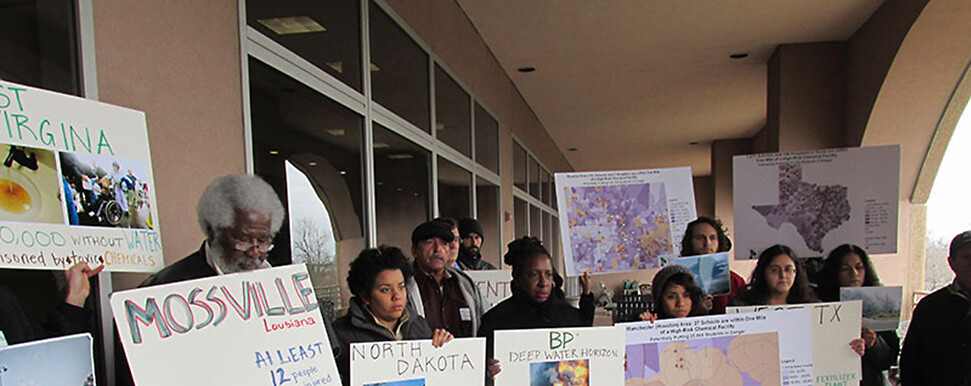
Media
March 1, 2024EPA finalizes critical new chemical disaster prevention rule after years of community pressure
The U.S. Environmental Protection Agency (EPA) finalized critical updates to its Risk Management Program (RMP) rule today that will require covered facilities that use and store highly hazardous chemicals to better prevent, prepare for, and respond to disasters. The EPA also made non-classified information about RMP facilities publicly available online for the first time. Environmental health and justice advocates praised the new requirements and information access, while underscoring that EPA has the authority to take additional action outside of this rulemaking to protect communities and workers from toxic chemical harms.
At least 323 hazardous chemical incidents occurred in 2023, according to data collected by the Coalition to Prevent Chemical Disasters; at least 81 of these incidents occurred at facilities regulated by the Risk Management Program.
The final rule partially reinstates mandates that were rolled back under the Trump administration by requiring select chemical manufacturing and petroleum refining facilities (NAICS codes 324 and 325 covered under the RMP) to evaluate and document the feasibility of applying safer technologies and alternatives. Some of these facilities will also be required to implement at least some of the safety measures identified in their Safer Technology and Alternatives Assessment (STAA). Facilities that process oil and gas to produce fuel, plastics and petrochemicals have been responsible for the majority of chemical incidents documented in news reports since 2021, including major fires, explosions and toxic releases.
“We’re glad that EPA stood its ground despite strong industry pressure and required more RMP facilities to report on safer chemicals and processes that could be implemented to prevent chemical disasters,” said Dr. Maya Nye, Federal Policy Director for Coming Clean. “This establishes an important precedent. We will continue urging EPA to require all RMP facilities to identify and transition to safer chemicals and processes in accordance with the principles laid out in the Louisville Charter for Safer Chemicals, as part of our ongoing work to transform the chemical industry so that it’s no longer a source of harm.”
Over 80 organizations joined Coming Clean and EJHA in a public comment in October 2022, urging EPA to finalize and further strengthen its proposed updates to the RMP. Many network members testified about how chemical disasters have impacted their communities.
The final rule includes a number of the requirements recommended by Coming Clean and EJHA, such as enhancing worker participation, requiring third-party compliance audits and root cause analysis incident investigation after facilities have reported an incident, and explicitly requiring RMP facilities to evaluate natural hazards fueled by climate change, such as hurricanes, wildfires and storm surges. A recent Government Accountability Office report warned that nearly one third of RMP facilities in the U.S. are located in areas threatened by natural hazards that may be worsened by climate change. A recent analysis published by Coming Clean and the Environmental Justice Health Alliance for Chemical Policy Reform (EJHA) shows that over 200 U.S. chemical incidents have been caused or worsened by weather events since 2021, including toxic flares triggered by power losses in the wake of Hurricane Ida.
EPA also published a database that allows any member of the public to search for RMP facilities, and the chemicals they store on site, responding to demands for transparency from community members across the country concerned about their proximity to hazardous facilities.
“Communities have been asking for this information for decades,” said Michele Roberts, Co-Coordinator of EJHA. “We have a right to know whether our houses, schools and places of worship are threatened by a potential chemical disaster. We look forward to a time when a database on RMP facility and hazard information will no longer be needed because every facility will have transitioned to safe chemicals and processes, but in the meantime EPA making this critical information more accessible to communities is a huge step.”
In its 2022 proposal, EPA acknowledged “the need for considering expanding fenceline monitoring for RMP-regulated facilities,” and “the need for reviewing the list of RMP-regulated substances,” particularly ammonium nitrate. Coming Clean and EJHA have consistently called for an expansion of the RMP to cover more processes and chemicals. EPA has the authority and the mandate to regularly review and update this list.
“We look forward to future action from EPA on these items, analyzing the final RMP rule in more detail, and monitoring the full implementation of this rule,” said Nye.
# # #
Coming Clean is a nonprofit environmental health collaborative working to transform the chemical industry so it is no longer a source of harm, and to secure systemic changes that allow a safe chemical and clean energy economy to flourish. Our members are organizations and technical experts — including grassroots activists, community leaders, scientists, health professionals, business leaders, lawyers, and farmworker advocates — committed to principled collaboration to advance a nontoxic, sustainable, and just world for all.
The Environmental Justice Health Alliance for Chemical Policy Reform is a national network of grassroots Environmental and Economic Justice organizations and advocates in communities that are disproportionately impacted by toxic chemicals from legacy contamination, ongoing exposure to polluting facilities and health-harming chemicals in household products. EJHA supports a just transition towards safer chemicals and a pollution-free economy that leaves no community or worker behind.
Learn more about Coming Clean and EJHA’s joint Chemical Disaster Prevention Program.
Available for Comment
Deidre Nelms; Coming Clean; (802) 251-0203 ext. 711, dnelms@comingcleaninc.org.
